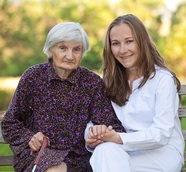Over three quarters of care homes respect privacy and dignity but there are still pockets of poor care, says CQC
Over three-quarters of care homes respect people’s privacy and dignity and meet their nutritional needs, according to the Care Quality Commission, which has published its first dedicated review of privacy, dignity and nutrition in both care homes and hospitals.
 The 2012 Dignity and Nutrition Inspection Programme (DANI) found that while most older people are having their needs met, a number of hospitals and care homes need to make improvements.
The 2012 Dignity and Nutrition Inspection Programme (DANI) found that while most older people are having their needs met, a number of hospitals and care homes need to make improvements.
It highlights the fact that often small changes can make a big difference to people’s experience of care. The CQC inspected 500 care homes and found 84 per cent respected people’s privacy and dignity and 83 per cent met people’s nutritional needs.
This means staff were aware of people’s likes and dislikes and made sure people with dementia were given support to choose and eat their food. However, there were times when inspectors witnessed people not being given help to eat and drink or not given personal care in a way that respected their privacy. The report also looked at the same issues in hospitals following on from 2011’s report on dignity and nutrition in NHS hospitals.
It found improvements in the way people’s nutritional needs were met, with 88 per cent of hospitals visited making sure people were helped to eat and drink compared to 83 per cent in 2011. Whilst this is good progress there are also pockets of poor care.
The CQC was disappointed that fewer hospitals are respecting people’s privacy and dignity, with 82 per cent meeting people’s needs compared to 88 per cent in 2011. CQC inspectors saw call bells left unanswered, leaving people without help to get to the toilet and without support for other needs.
CQC chief executive David Behan said: “We found good care and care that had improved. However, it is disappointing people are still not being given enough privacy when receiving personal care and that they are left alone when they call for help.
“This is basic care and getting it right can transform a stressful experience for an older person into a supportive and caring one.
“Safe, good quality care is not complex or time-consuming. Effective leadership and staff who feel supported make this happen every day. We want services to learn from the best.”
In the wake of the report, the National Pensioners Convention (NPC) has called on the Government and local authorities to do more to improve these pockets of poor care. Dot Gibson, NPC general secretary said: “One report after another shows that we still cannot guarantee that when an older person goes into hospital or a care home that they will have their dignity respected. This is tantamount to institutionalised abuse.
“Where else in our society would we tolerate such neglect without a huge public outcry? Yet for millions of older people they have no-one to speak out on their behalf. Staff need to be properly trained and qualified and caring needs to be professionalised – rather than giving it to those who are paid the least. Taking time to feed someone or to look after their appearance doesn’t cost a huge amount of money – but it takes compassion and the need to see the individual as a human being rather than as a nuisance.
“That is why the NPC is calling on the care minister Norman Lamb to introduce the NPC’s Dignity Code throughout his department as a matter of urgency, as a way of ensuring minimum statutory rights for older people in care.”
Cllr David Rogers, chair of the LGA’s Community Wellbeing Board, called it “unacceptable” that there “are a small number of care homes that are failing to ensure all older people are receiving the support they may need to eat and drink”.
He added: “Local authorities will continue to work with the Care Quality Commission to stamp out poor performance from care providers and will stop using those who fall below suitable levels.
While Alex Jackson, co-ordinator of the Campaign for Better Hospital Food, called for better quality hospital meals for patients and said: “We’re pleased that more patients are being helped to eat in hospital, but it remains essential to improve the quality of hospital meals on offer. The Care Quality Commission’s report gives us next to no information about the healthiness or quality of hospital food, including how much saturated fat and salt is contained in meals. For these inspections to be useful, they must compare patient meals against clear nutritional and quality standards, as is required in schools.”
CQC published its first DANI programme in October 2011, which checked two standards at 100 hospitals. The inspections have been widened to include five standards for this programme. The inspections took place last summer. Inspection teams included nurses, geriatricians, dieticians and people with experience of using services, called Experts by Experience.
Latest News Analysis
 04-Sep-19
Extra £1.5 billion announced for social care in Chancellor's Spending Review
04-Sep-19
Extra £1.5 billion announced for social care in Chancellor's Spending Review
 02-Jul-19
Department of Health forced to rethink care homes' nursing rates after legal challenge
02-Jul-19
Department of Health forced to rethink care homes' nursing rates after legal challenge
 18-Jun-19
Overnight care workers forced to sleep in offices and told 'bring your own bedding'
18-Jun-19
Overnight care workers forced to sleep in offices and told 'bring your own bedding'
 14-Jun-19
Back in the closet: Third of care home staff have had no LGBT+ awareness training
14-Jun-19
Back in the closet: Third of care home staff have had no LGBT+ awareness training
 11-Jun-19
PM candidates on social care: Rory Stewart calls fixing care an 'unfinished revolution'
11-Jun-19
PM candidates on social care: Rory Stewart calls fixing care an 'unfinished revolution'